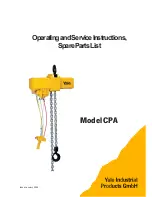
30
5.52.181.01.01.07
Secure the working area of moving parts of the unit.
Please read the chapter "Safety instructions".
Notes on the repair of faults are found in the following table.
For the repair of failures please contact our service department.
CAUTION!
Trouble caused by wear or damage to parts such as wire ropes, chains, chain wheels, axes, bearings,
brake parts, etc., must be remedied by replacing the parts with original spare parts.
16
Remedy
Problem*
Unit
Cause
Remedy
Unit cannot be switched on
Electric Hoists
No main power
Check connection to mains supply
Phase sequence not correct (with low voltage
control)
exchange 2 phases
(see waring note at the plug)
Hoist motor does not run
Electric Hoists
Fuse burnt out
Replace the fuse
Defective switching unit in the control button switch
Replace the switching unit
Interruption in the control cable
Check control cable and replace if necessary.
Defect of capacitor (only for alternating current 1).
Replace the capacitor
Overheat protection has tripped*
Allow engine to cool
Defective coil - mechanic or electric overload
Motor must be repaired by a specialist
If the unit is suitable for explosive atmosphere, the motor
must be returned to the manufactuerer for repair!*
Pneumatic hoists and
winches
Operation pressure/ quantity of air is too low
Check connection to mains supply
After prolonged standstill
See maintenance - pneumatic motor
Hoist motor runs – load is not lifted
For motor driven
chain hoists.
and winches
Overload protection is activated - (with overload)
Reduce the load to nominal load
Overload protection is activated - (with =< nominal
load)
Check settings and reset if necessary
No or incorrect power transmission
Let the unit be repaired by en expert
For EX-hoists, please clarify with the manufacturer what to
do!*
Hoist motor is running – chain does not lower
For motor driven
chain hoists.
Blockage due to chain link pointing sideways in the
feed from the chain container*
Check the chain - lubricate if necessary
and/or select a larger chain container so that the chain
can be properly arranged before the inlet
Motor hums and uses excessive current
Electric hoists and
winches
Defective coil
Motor must be repaired by a specialist
If the unit is suitable for explosive atmosphere, the motor
must be returned to the manufactuerer for repair!*
Rotor is rubbing
Brake does not release
See problem “Brake does not release”
Defect of capacitor (only for alternating current 1).
Replace the capacitor
Defect of starter relay (only for alternating current 1). Replace the starter relay
Phase failure (only direct control)
Find the cause and repair
Motor does not brake or has excessive afterrun-
ning.
Electric hoists and
winches
Switching error after intervention in the electric circuit
Check the electric connection of the brake acc. to the
wiring diagram
For motor driven
units.
Brake linings are worn or dirty.
Brake lining carrier must be changed completely
If the unit is suitable for explosive atmosphere, the brake
must be returned to the manufacturer for repair!*
Air gap is too large
Re-adjust the air gap
If the unit is suitable for explosive atmosphere, the brake
must be returned to the manufacturer for repair!*
Brake does not release
Electric hoists and
winches
Brake rectifier defective
Replace the brake rectifier
If the unit is suitable for explosive atmosphere, the brake
must be returned to the manufacturer for repair!*
Brake current relay defective
Replace the brake current relay
Brake coil is defective
Replace the brake coil
If the unit is suitable for explosive atmosphere, the brake
must be returned to the manufacturer for repair!*
Permissibe air gap is exceeded due to worn out
brake lining
Re-adjust the air gap and exchange the brake lining if
necessary
If the unit is suitable for explosive atmosphere, the brake
must be returned to the manufacturer for repair!*
Power drop in the mains power line > 10%
Provide correct power supply voltage
Pneumatic hoists and
winches
Operation pressure/ quantity of air is too low
Check connection to mains supply
Fuses burnt out or motor contactor is triggered
Electric hoists and
winches
Short circuit in component
Eliminate the short circuit
Motor has a short circuit in the body or windings
Correct the problem by a specialist
For EX-hoists, please clarify with the manufacturer what to
do!*
Motor is switched incorrectly
Correct the switching
Wrong type of fuse
Replace the fuse with correct one
(see table "fuses")
*) as far as applicable
17
Decommissioning
WARNING!
It is essential that the following points are observed in order to prevent damage to the equipment or critical
injury when the device is being decommissioned:






















